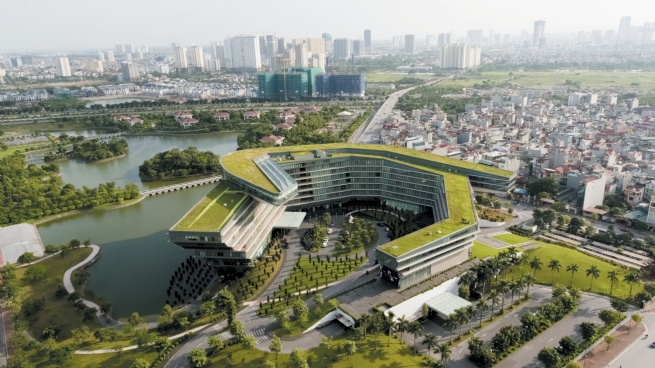9:52:05 AM | 10/10/2024
After 70 years of continuous growth, Hanoi has become a model of a modern, sustainable economy, showcasing transformations in trade, services and advancements in the digital and green sectors, solidifying its role as a major economic hub in the country.

After 70 years, Hanoi has made significant advancements in the digital and green sectors
Mr. Le Quoc Phuong, former Deputy Director of the Center for Industry and Trade Information (Ministry of Industry and Trade), emphasized that Hanoi has made positive strides in economic development. The city has taken the right direction by prioritizing trade, services and tourism. The trade sector not only meets the daily needs of residents but also supports production and business activities, significantly contributing to the city's economic growth with trade and service sectors accounting for nearly two-thirds of the local GRDP.
Hanoi currently boasts a modern trade system with around 30 shopping centers, nearly 150 supermarkets, 455 markets (including wholesale and retail markets), thousands of convenience stores, and hundreds of vending machines.
The tourism sector has also achieved significant success, becoming one of the city’s key economic drivers. In 2023, Hanoi welcomed 24 million visitors, including 20 million domestic tourists and four million international visitors. Hanoi's rapid tourism expansion earned it a spot in the top 10 cities with the fastest-growing tourism sector, and ranked 15th in the list of the most popular tourist destinations globally. These accomplishments have not only contributed to economic growth but also enhanced Hanoi’s position on the international tourism map.
Hanoi plays a pivotal role in Vietnam’s key economic indicators, despite accounting for just 1% of the country’s land area and 8.5% of its population. It contributes 16% to the national GDP, 18.5% to the state budget revenue, and 20% to domestic revenue. These figures underscore Hanoi's position as a major economic hub and an important international trade center, serving as a key growth engine for both the Red River Delta region and the country at large.
Dr. Dinh Trong Thinh, former Head of the Department of International Finance at the Academy of Finance, highlighted Hanoi’s remarkable income growth from 2010 to 2023, with the city consistently leading the nation in GRDP, averaging an annual growth rate of around 7%. Notably, in 2023, Hanoi's per capita income surpassed that of Ho Chi Minh City for the first time, affirming the capital’s exceptional development.
Hanoi continues to be a top destination for Foreign Direct Investment (FDI). In 2023, the city secured approximately US$2.34 billion in FDI, 2.89 times that of the same period the previous year, accounting for around 12.9% of the nation's total FDI. This substantial growth places Hanoi among the top five FDI-attracting localities in Vietnam, alongside HCM City, Hai Phong and Binh Duong.
This impressive FDI growth has spurred the development of numerous domestic businesses, positioning Hanoi as a key destination for international investors, especially in manufacturing, logistics and technology. To drive sustainable growth, Hanoi is focusing on the digital and green economies to improve resource efficiency and protect the environment, aligning with global innovation trends and Industry 4.0.
According to Hanoi’s Digital Transformation Program for 2025, with a vision toward 2030, the city aims to become the nation's innovation and startup hub and rank among the top three localities in digital transformation, information technology, competitiveness and cybersecurity. Hanoi is expected to derive 40% of its GRDP from the digital economy and increase labor productivity by more than 7.5% annually.
Nguyen Ngoc Son, Vice Rector of the School of Economics and Public Management, emphasized that Hanoi needs to shift its growth model toward efficient resource use, environmental sustainability, and fostering an economy based on innovation and digitalization. This approach not only drives rapid growth but also ensures sustainable quality and global competitiveness.
Nguyen Hoang, Chairman of N&G Holding Group, suggested that Hanoi should thoroughly study the 17 United Nations Sustainable Development Goals and learn from the development models of advanced capitals in Asia and Northern Europe to craft a specific sustainable development plan. He also stressed the importance of comprehensive investment in research and development across all sectors to create a roadmap for sustainable growth with input from businesses and experts alike.
Hanoi’s 70-year journey opens a new chapter of development, solidifying its position as one of Vietnam's leading economic centers with ambitions to reach regional and global status through sustainable development and digital transformation.
By Huong Giang, Vietnam Business Forum